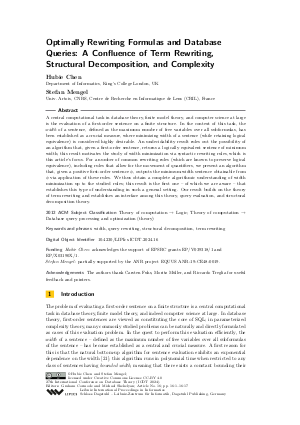@InProceedings{chen_et_al:LIPIcs.ICDT.2024.16,
author = {Chen, Hubie and Mengel, Stefan},
title = {{Optimally Rewriting Formulas and Database Queries: A Confluence of Term Rewriting, Structural Decomposition, and Complexity}},
booktitle = {27th International Conference on Database Theory (ICDT 2024)},
pages = {16:1--16:17},
series = {Leibniz International Proceedings in Informatics (LIPIcs)},
ISBN = {978-3-95977-312-6},
ISSN = {1868-8969},
year = {2024},
volume = {290},
editor = {Cormode, Graham and Shekelyan, Michael},
publisher = {Schloss Dagstuhl -- Leibniz-Zentrum f{\"u}r Informatik},
address = {Dagstuhl, Germany},
URL = {https://drops.dagstuhl.de/entities/document/10.4230/LIPIcs.ICDT.2024.16},
URN = {urn:nbn:de:0030-drops-197984},
doi = {10.4230/LIPIcs.ICDT.2024.16},
annote = {Keywords: width, query rewriting, structural decomposition, term rewriting}
}

 Creative Commons Attribution 4.0 International license
Creative Commons Attribution 4.0 International license



